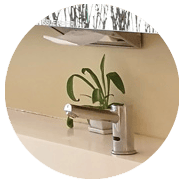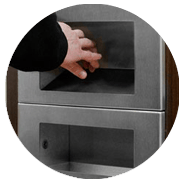Washroom Accessories Product Care
Care & Maintenance of Stainless Steel
Stainless steel products are selected where their inherent corrosion resistance, strength and aesthetic appeal are required. However, dependent on the service conditions, stainless steel can stain and discolour due to surface deposits and so cannot be assumed to be completely maintenance free.
In order to achieve maximum corrosion resistance and aesthetic appeal, the surface of the stainless steel must be kept clean. If cleaning schedules are carried out on a regular basis, good performance and long service life will result.
Cleaning Methods
Stainless Steel:
Clean with a stainless steel cleaner, DO NOT use soap, chemical cleaning detergents, bleach or abrasive cleaners. Should mild detergent be used, please ensure that the detergent is fully rinsed off unit prior to drying.
Painted surfaces and architectural lacquers:
If the dispensers have a paint finish applied such as a powder coat or clear lacquer, wipe over with a soft damp cloth and dry thoroughly with a soft dry cloth.
Factors Affecting Maintenance
Surface contamination and the formation of deposits must be prevented. These deposits may be minute particles of iron or rust from other sources used on the building of new premises and not removed until after the stainless steel items have been fixed. Industrial and even naturally occurring atmospheric conditions can produce deposits, which can be equally corrosive, e.g. salt deposits from marine conditions. Working environments can also provide aggressive conditions such as heat and humidity, in a swimming pool building.
These conditions can result in surface discoloration of stainless steels and so maintenance on a more frequent basis may be required. Strong acid solutions are sometimes used to clean masonry and tiling of buildings.
These acids should never be used where contact with stainless steel is possible, but if this happens, the acid solution must be removed immediately, followed by dilution and rinsing with clean water.
Maintenance Programme
Where surface contamination is suspected, immediate cleaning after site fixing should avoid problems later. Food handling, pharmaceutical, aerospace and certain nuclear applications required extremely high levels of cleanliness applicable to each industry. The frequency of cleaning is dependent on the application; a simple rule is;
Clean the metal when it is dirty in order to restore its original appearance.
This may vary from one to four times a year for external applications, but may be daily for items in “hygienic” applications.
Vision & Values
We pride our-self on our flexible approach and competitive prices. Our skilled and experienced workforce is committed to manufacturing products with an emphasis on quality, for the benefit of our customers.
Our Warranty
Dudley’s products are manufactured and warranted to be free from defects in components and factory workmanship under normal use and service.
Delivery
We aim to deliver direct from our stock within 3 working days for standard products, bespoke products will incur a lead time of up to 4 weeks plus delivery time.
Our Products
Our innovation in washroom accessories equipment ensures we continually develop products that offer different types of business the right solutions.


